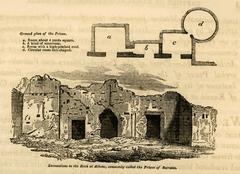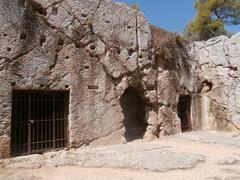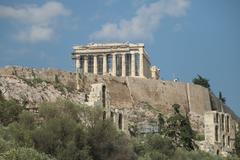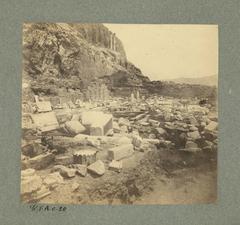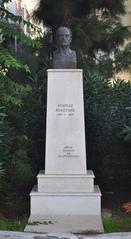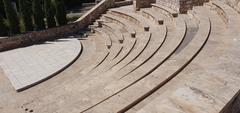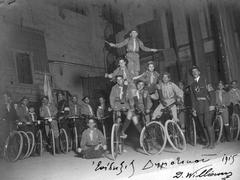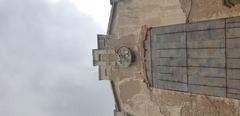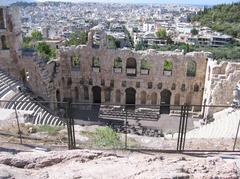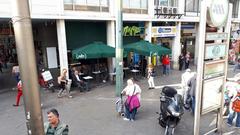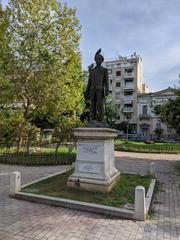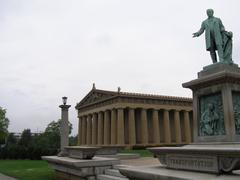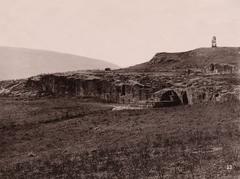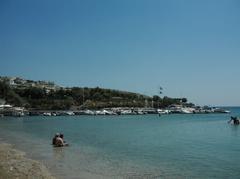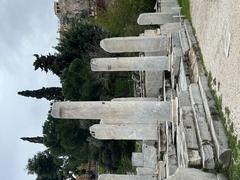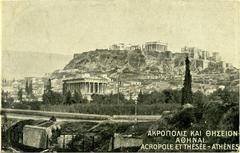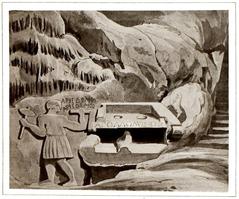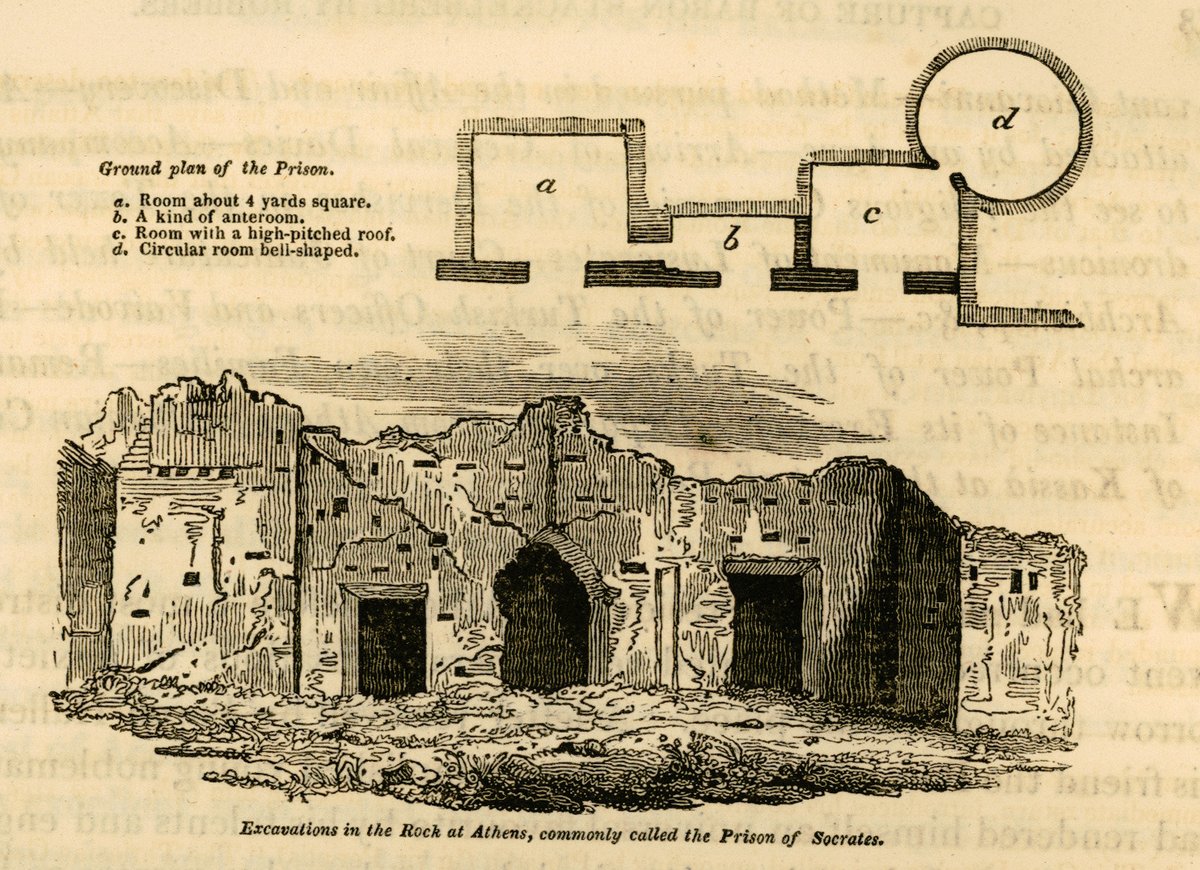
Visiting Pnyka Hill: Hours, Tickets, and Historical Significance
Date: 19/07/2024
Why Visit Pnyka Hill?
Pnyka Hill, located in Athens, Greece, is an ancient site of immense historical and cultural significance. Known as the birthplace of Athenian democracy, it served as the meeting place for the Ecclesia, the principal assembly of the democracy of ancient Athens. This assembly was a pioneering institution where citizens gathered to discuss and vote on public policy, laws, and other civic matters, laying the foundational principles of democracy that have influenced political thought and governance worldwide (World History Encyclopedia). The hill’s meticulously designed layout, with its semicircular platform and elevated bema, could host up to 6,000 citizens, illustrating the importance of public participation in governance (Ancient Greece). Today, Pnyka Hill remains a symbol of civic engagement and public discourse, attracting visitors from around the globe who wish to explore its rich history and architectural marvels.
Table of Contents
- Introduction
- Ancient Origins and Early Use
- Architectural Layout and Structure
- Historical Significance
- Visitor Information
- Nearby Attractions
- Accessibility
- Special Events and Guided Tours
- Photographic Spots
- Conclusion
- FAQ
Exploring Pnyka Hill - Visiting Hours, Tickets, and The Birthplace of Athenian Democracy
Introduction
Pnyka Hill in Athens, Greece, is not only a significant historical site but also the birthplace of Athenian democracy. This article will explore its rich history, architectural layout, and modern-day significance, along with essential visitor information such as visiting hours, ticket prices, travel tips, and nearby attractions.
Ancient Origins and Early Use
Pnyka Hill’s origins date back to the early 5th century BCE, during the height of Athenian democracy. The hill served as the meeting place for the Ecclesia, the principal assembly of the democracy of ancient Athens. This assembly was crucial for the functioning of the democratic process, where citizens gathered to discuss and vote on various political matters (World History Encyclopedia).
Architectural Layout and Structure
The Pnyka Hill’s layout was meticulously designed to accommodate large gatherings. The assembly area, known as the Pnyx, includes a semicircular platform that could host up to 6,000 citizens. The bema, or speaker’s platform, was elevated to ensure that the speaker could be seen and heard by all attendees.
Historical Significance
As the cradle of democracy, Pnyka Hill holds immense historical significance. It was here that prominent Athenian statesmen like Pericles and Themistocles addressed the citizens. The decisions made at Pnyka Hill shaped the political landscape of ancient Athens and laid the foundation for democratic governance.
Visitor Information
Visiting Hours: Pnyka Hill is open to visitors year-round, typically from 8:00 AM to 8:00 PM. However, hours may vary seasonally, so it’s advisable to check the official website before planning your visit.
Ticket Prices: Admission to Pnyka Hill is free, making it an accessible destination for all visitors interested in exploring this historic site.
Travel Tips:
- Wear comfortable walking shoes, as the terrain can be uneven.
- Bring water, especially during the summer months, as it can get quite hot.
- Consider visiting early in the morning or late in the afternoon to avoid the midday heat and crowds.
Nearby Attractions
Pnyka Hill is located near several other significant historical sites:
- Acropolis of Athens: A UNESCO World Heritage site that includes the Parthenon, Erechtheion, and other ancient structures.
- Philopappos Hill: Offers stunning views of Athens and is home to the Philopappos Monument.
- Ancient Agora of Athens: The heart of ancient Athens, where social, political, and commercial activities took place.
Accessibility
Pnyka Hill is accessible by public transportation, including buses and the Athens Metro. There are also walking paths leading to the hill from various points in the city. While the site is generally accessible, some areas may be challenging for visitors with mobility impairments due to uneven surfaces.
Special Events and Guided Tours
Pnyka Hill occasionally hosts special events, such as historical reenactments and cultural festivals. Guided tours are available and provide a deeper understanding of the site’s history and significance. Check local listings or the official website for more information.
Photographic Spots
Pnyka Hill offers several excellent spots for photography, including panoramic views of Athens and the Acropolis. The site is particularly photogenic during sunrise and sunset.
Conclusion
Pnyka Hill is a must-visit destination for anyone interested in the history of democracy and ancient Athens. With its rich historical significance, architectural marvels, and stunning views, it offers a unique glimpse into the past. Plan your visit today and immerse yourself in the birthplace of Athenian democracy.
FAQ
Q: What are the visiting hours for Pnyka Hill?
A: Pnyka Hill is typically open from 8:00 AM to 8:00 PM, but hours may vary seasonally. Check the official website for updated information.
Q: How much does it cost to visit Pnyka Hill?
A: Admission to Pnyka Hill is free.
Q: Are there guided tours available?
A: Yes, guided tours are available and offer a deeper insight into the history and significance of Pnyka Hill.
Q: What nearby attractions should I visit?
A: Nearby attractions include the Acropolis of Athens, Philopappos Hill, and the Ancient Agora of Athens.
Q: Is Pnyka Hill accessible for visitors with mobility impairments?
A: While generally accessible, some areas of Pnyka Hill may be challenging due to uneven surfaces.
Discover the Historical Significance of Pnyka Hill - Visiting Hours, Tickets, and Travel Tips in Athens
Historical Significance of Pnyka Hill
Ancient Assembly and Democracy
Pnyka Hill, located in Athens, Greece, is one of the most significant historical sites in the world, primarily due to its role in the development of democracy. The hill served as the meeting place for the Athenian democratic assembly, known as the Ecclesia, from the early 5th century BCE. This assembly was a pioneering institution where citizens gathered to discuss and vote on public policy, laws, and other civic matters. The Pnyka is often considered the birthplace of democracy, a system that has profoundly influenced political thought and governance worldwide.
The assembly met approximately 40 times a year, and attendance was open to all male citizens of Athens who were over the age of 18. The Pnyka could accommodate around 6,000 people, although the quorum for major decisions was 6,000. The speaker’s platform, known as the Bema, is still visible today and is a poignant reminder of the democratic debates that once took place there. (Ancient Greece)
Architectural and Archaeological Insights
The Pnyka Hill’s archaeological remains provide valuable insights into ancient Greek architecture and urban planning. The site includes the remnants of the Bema, seating areas, and other structures that supported the assembly’s functions. Excavations have revealed three distinct phases of construction, reflecting the evolving needs and growing importance of the assembly over time.
- First Phase (circa 507-450 BCE): The earliest phase involved a simple, open-air meeting space with a natural slope used for seating.
- Second Phase (circa 450-330 BCE): This phase saw the construction of a more formalized meeting area with stone seating and a more prominent Bema.
- Third Phase (circa 330-300 BCE): The final phase included further enhancements to the seating area and the addition of retaining walls to support the increased attendance and activities.
These phases illustrate the development of democratic practices and the increasing complexity of civic life in ancient Athens. (Pnyx)
Cultural and Political Impact
Influence on Modern Democracies
The democratic practices established at Pnyka Hill have had a lasting impact on political systems around the world. The principles of direct democracy practiced here, where citizens had the right to speak and vote on issues directly, have inspired modern democratic institutions. While most contemporary democracies are representative rather than direct, the foundational ideas of citizen participation and equality before the law trace their origins back to the Pnyka.
The concept of isegoria, or equal right to speak, was a cornerstone of the Athenian assembly and is reflected in modern democratic values such as freedom of speech and equal representation. The Pnyka’s legacy is evident in the democratic frameworks of many countries, including the United States, where the Founding Fathers drew inspiration from ancient Greek political philosophy. (Democracy)
Symbol of Civic Engagement
Pnyka Hill is not only a historical site but also a symbol of civic engagement and public discourse. The very act of gathering in a public space to discuss and decide on matters of common interest is a powerful reminder of the importance of active citizenship. The Pnyka serves as a testament to the idea that democracy is not just a system of government but a way of life that requires the active participation of its citizens.
In contemporary times, the Pnyka continues to inspire movements for democratic reforms and civic participation. It stands as a symbol of the enduring power of collective decision-making and the importance of public spaces in fostering dialogue and community engagement. (Civic Engagement)
Visitor Tips and Practical Information
Getting to Pnyka Hill
Pnyka Hill is located near the Acropolis in Athens, making it easily accessible for visitors. The site is within walking distance from the Acropolis metro station and other major landmarks such as the Parthenon and the Ancient Agora. Visitors can follow signs and maps available at the Acropolis to reach the Pnyka.
Best Visiting Times
The best time to visit Pnyka Hill is during the spring (April to June) and autumn (September to November) when the weather is mild and pleasant. These seasons offer comfortable temperatures for exploring the outdoor site. Summer months can be very hot, so it is advisable to visit early in the morning or late in the afternoon to avoid the midday heat.
Essential Items to Bring
Visitors should wear comfortable walking shoes as the terrain can be uneven and rocky. It is also recommended to bring water, sunscreen, and a hat, especially during the warmer months. There are no facilities on the site, so it is advisable to carry any necessary supplies.
Guided Tours
While the Pnyka Hill can be explored independently, guided tours are available and can provide valuable historical context and insights. Many tours of the Acropolis and surrounding areas include a visit to the Pnyka. Information panels and plaques are also available on-site, offering details about the history and significance of the location.
Respecting the Site
As a historical and archaeological site, it is important to respect the Pnyka Hill. Visitors should avoid climbing on the ancient structures and follow any posted guidelines to help preserve the site for future generations. Photography is allowed, but it is advisable to check for any restrictions on the use of tripods or other equipment.
Nearby Attractions
When visiting Pnyka Hill, consider exploring nearby attractions to make the most of your trip to Athens. Some notable sites include:
- The Acropolis: A must-visit landmark featuring the Parthenon, Erechtheion, and other ancient structures.
- Ancient Agora: Once the heart of ancient Athens, this site offers insights into the city’s social and political life.
- National Archaeological Museum: Home to an extensive collection of ancient Greek artifacts.
FAQ
Q: What are the visiting hours for Pnyka Hill? A: The site is open from sunrise to sunset. However, it is advisable to check for any seasonal variations or special closures.
Q: How much are tickets to Pnyka Hill? A: Entry to Pnyka Hill is usually free of charge. Guided tours may have their own pricing.
Q: What is the best way to reach Pnyka Hill? A: The easiest way to reach Pnyka Hill is by taking the metro to the Acropolis station and then walking to the site.
Q: Are guided tours available for Pnyka Hill? A: Yes, several tour operators offer guided tours that include Pnyka Hill.
Q: Is Pnyka Hill accessible to visitors with mobility issues? A: The terrain is uneven and challenging, but efforts are being made to improve accessibility.
Call to Action
By understanding and appreciating the historical significance of Pnyka Hill, visitors can gain a deeper insight into the origins of democracy and the enduring legacy of ancient Athens. Download our mobile app Audiala for more travel tips and guides. Check out other related posts on our site and follow our social media channels for the latest updates.
Conclusion
Visiting Pnyka Hill offers a unique opportunity to connect with the roots of democracy and experience the historical ambiance of ancient Athens. The site not only provides a glimpse into the architectural ingenuity of the time but also underscores the enduring legacy of democratic principles that continue to shape modern governance. With free admission, accessible visiting hours, and proximity to other significant historical sites like the Acropolis and the Ancient Agora, Pnyka Hill is an essential stop for any traveler interested in history and culture. Whether you choose to explore independently or join a guided tour, the insights gained here will deepen your appreciation for the democratic ideals that originated on this very hill. As you stand on the bema, imagine the voices of ancient statesmen like Pericles and Themistocles, whose speeches and decisions have left an indelible mark on history (Democracy). Plan your visit today to immerse yourself in the birthplace of democracy and enjoy the stunning views and rich narratives that Pnyka Hill has to offer.
References
- World History Encyclopedia. (n.d.). Pnyx. Retrieved from https://www.worldhistory.org/Pnyx/
- Ancient Greece. (n.d.). Pnyx. Retrieved from https://www.ancient.eu/Pnyx/
- Democracy. (n.d.). In History. Retrieved from https://www.history.com/topics/ancient-greece/ancient-greece-democracy
- Civic Engagement. (n.d.). In Brookings. Retrieved from https://www.brookings.edu/research/civic-engagement-and-democracy/
- Pnyx. (n.d.). In Britannica. Retrieved from https://www.britannica.com/place/Pnyx
